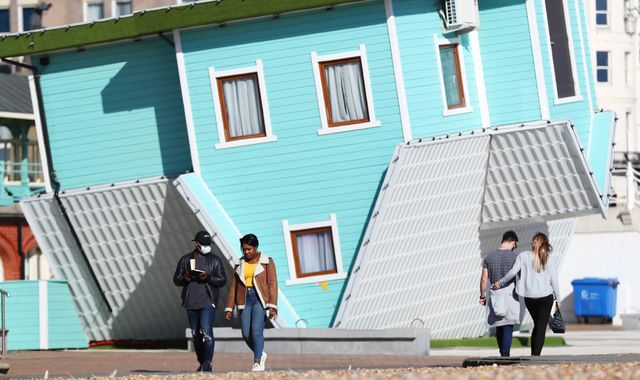Coronavirus: Five things that will never be the same again because of COVID-19
Written by News on 05/04/2020
While thousands of people will have lost loved ones, the biggest impact coronavirus could have is on the way millions of people behave in the future.


Here are some of the ways the post-COVID-19 world will change:
Society
It seems like an age ago now, but it was only five months ago that people across the nation were at each other’s throats over whether the UK should leave the EU. Society seemed more divided than ever.
And then came the greatest crisis for at least a generation and potentially since the war, as people were forced to self-isolate or face the risk of death, serious illness or at least passing it to someone else who could become seriously ill.
Britain suddenly became a more caring nation.
Millions have been standing to applaud their healthcare and emergency workers, communities have been rallying round, checking what vulnerable people need and hundreds of thousands have volunteered to help those most in need.
The biggest change potentially is the relationship between people and government, and politics. All parties are broadly in agreement about what needs to be done, for once – to follow the experts.
Meanwhile, our relationship with the state has changed completely, with millions relying on an unprecedented announcement from government that it will pay their wages if they are furloughed as a result of the crisis – something never done before.
It may be temporary, but it will fundamentally reassess the way individuals see the state and their part in it and vice-versa.
Some believe it will go on to have lasting profound change.
Dr Doug Parr, chief scientist for Greenpeace UK, said: “We will get through the current crisis, and once that happens we can push the government to protect our planet and put the economy onto a safer and more sustainable footing – because we all know they have it in their power to do so.”
Work
Millions of people who spend a significant proportion of their lives commuting to a single place of work have suddenly found they can do exactly the same job from the comfort of their sofas.
As well as saving them potentially hours of the day, it has allowed them to have a different relationship with their families or home lives. For some, this may have been more isolating than it was before, underscoring the value of working with a group of people who can act as a support network.
Meanwhile, those who took part in the explosion of small scale entrepreneurism that erupted after the financial crisis have suddenly found that much of their income depends on people being able to move freely and buy what they want – something not possible in a lockdown.
Experts fear this will lead to thousands if not hundred of thousands of job losses, and may lead to many of those people who run businesses or were happy being self-employed, reassessing whether it safe for them to do so in the future. Others may find that they are empowered by the crisis.
James Taylor, spokesman for disability equality charity Scope, said: “Businesses that work flexibly thrive, so long may this continue after the pandemic has faded.”
Another major change to Briton’s working patterns may come from the changed relationship they have with their childcare.
With millions of children forced to stay home, many people are having to work out new ways of maintaining an income while looking after youngsters. The legacy of this will extend beyond the point when children go back to school.
Technology
Never in the history of the internet has there been such a sudden shift in the way we use online technology as now.
Unable to meet people face-to-face, the world has suddenly shifted from direct contact to having virtual meetings overnight.
Whether it is holding board meetings via teleconferencing, putting an accused suspect in a virtual court dock, or talking to your grandmother on FaceTime because you can’t go to see her on Mothering Sunday, people are using versions of video conferencing in a way and to an extent they have never done before.
As well as introducing millions to a fringe technology which up to this point was, really, just limited to those who already worked virtually, the crisis has put massive strains on the internet infrastructure itself – which in some parts of the country was struggling to maintain any sort of reasonable speed anyway.
It has exposed those places where internet black spots are reinforcing people’s isolation. When the lockdown is over, there will be renewed pressure to make sure infrastructure is improved.
The situation is so bad that Rishi Sunak pledged to pump £5bn into the rollout of full-fibre broadband in the latest budget in a bid to “level up” the UK.
Councillor Mark Hawthorne, the Local Government Association’s digital connectivity spokesman, said: “We have long-called for funding and support to bridge the digital connectivity gap.”
He added: “The LGA has previously called for a ‘social tariff’ to ensure a basic service is available at an affordable price to those most in need.”
Leisure
Never before have British people appreciated their open spaces as much as when they are facing the threat of being unable to access them.
One of the few outlets to the frustration caused by the government’s lockdown is to be able to go out to exercise once a day.
It has prompted millions of people to get out and run, walk or just amble outside of their houses in a break from the monotony. At the same time, parks have been closed to the public, beaches have become forbidden spaces and Britons have been told not to drive to beauty spots.
As well as appreciating the outside like never before, one of the benefits of the shutdown has been a rapid increase in air quality in cities as cars sit idle.
Some believe this will have long lasting effects.
A spokesman for London mayor Sadiq Khan said: “Once the current emergency has passed, our challenge will be to do all we can to have cleaner air at all times which is why schemes like the Ultra Low Emission Zone and the further roll out of electric vehicle charge points will be vital.”
But the biggest potential impact on our leisure time has been the effect of the coronavirus crisis on the tourism industry.
With people unable to leave their houses in many parts of the world, no one has been able to go on holiday, leaving millions of previously perfectly viable businesses without any income.
Flybe was the first airline to fall victim to the crisis and there are fears that others could follow suit. Other major operators are at risk as are millions of small hotels, holiday lets, campsites, and other businesses like cafes and tour guides, that rely on the tourist pound, dollar or euro.
Consumption
While the supermarkets have seen sales in the last few weeks rivalling their busiest periods of the year, the lockdown has been disastrous for the high street.
Town and shopping centre retailers were already reeling from the rise of internet shopping, but with many who operate on tiny margins forced to close for potentially several months, there could be several chains which do not survive.
As the chains suffer, small retailers and local shops are thriving. With people dissuaded from driving and told not to shop for leisure, most people are relishing the chance to leave their homes to buy the food they need from a business close to home – with cafes and restaurants which have switched to providing takeaways apparently flourishing, and food providers like veg box suppliers reportedly selling out.
And those people who are able to get online supermarket delivery slots, who previously visited the stores, may decide they prefer it.
Consumer intelligence company Springboard thinks it may speed the change in the way we shop.
Diane Wehrle, Springboard’s insights director, said: “Now that they are once again familiar to consumers and being successful in delivering what is required, this episode may well provide a much needed catalyst for shopping locally and supporting small stores.”
Meanwhile, with food supply chains suddenly under threat, people are finding themselves thinking differently about waste and how much they throw away.
The threat that we could return to the bad old days of the Winter of Discontent in 1979 has renewed our appreciation for the weekly or biweekly collection.
And there has been an explosion in articles and explainers advising people how to reduce waste, with Great British Bake Off star Nadia Hussain even teaching the frugal nation how to cook up banana skins.
(c) Sky News 2020: Coronavirus: Five things that will never be the same again because of COVID-19






